|
An aide awakened Gregg at dawn on May 12 with the information that
Yankees were coming up the Utica road toward Raymond. Gregg, on the
basis of this and information from Pemberton's headquarters, completely
misread the situation that faced him. He thought that the entire
Federal army was wheeling to its left to attack the railroad somewhere
in the Edwards area. So he assumed that the Federals moving toward
Raymond must be a rear guard or part of a screening movement on the
extreme right flank of Grant's army. Actually, the approaching Yankees
were the vanguard of McPherson's entire corps which formed the right
wing of the Union army.
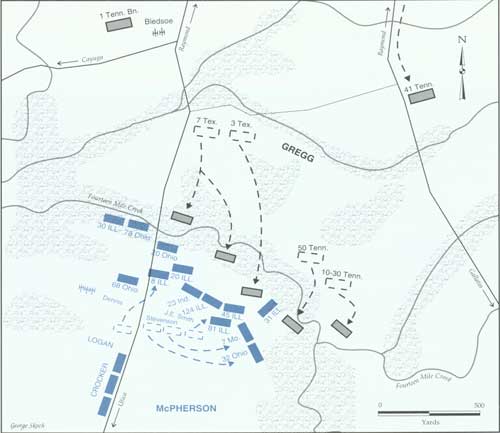
(click on image for a PDF version)
|
BATTLE OF RAYMOND, MAY 12, 1863, NOON TO 1:30 P.M.
General John Gregg is ordered by Pemberton to attack Grant's flank and rear.
Pemberton believes Grant is turning from Jackson toward Big Black. He
thinks Federal troops moving toward Jackson are carrying out a feint.
When Gregg gets reports that a Union column is coming toward Raymond, he
assumes it is the feint mentioned by Pemberton. These troops are the
advance of James McPherson's corps. By the time Gregg realizes he is
heavily out numbered, his small force is engaged with the enemy along
Fourteen Mile Creek.
|
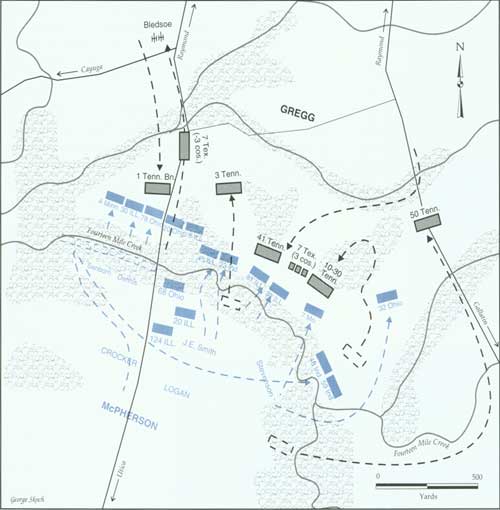
(click on image for a PDF version)
|
BATTLE OF RAYMOND, MAY 12, 1863, 1:30 TO 2.30 P. M.
The battle is marked by uncoordinated attacks and counterattacks. Dust and smoke
hamper both sides' efforts. Overwhelming Federal pressure finally pushes
back Gregg's right, forcing him to order a general retreat back
through Raymond and on to Jackson. His brigade will not be able to fight
any more for Pemberton because Grant, who up to this point has been leaning
toward moving on the Big Black, decides to go on to Jackson to
remove the threat of Johnston, thus preventing Gregg from marching his
men to Pemberton at the Big Black. Gregg and his men join Joseph
Johnston in Mississippi's capital city.
|
The aggressive Gregg attacked about two miles south of Raymond in the
Fourteen Mile Creek area. As the fighting developed, Gregg soon realized
his mistake, but his men valiantly fought for several hours before
sheer weight of numbers forced him to retreat. Since it was too
dangerous to withdraw across the enemy front toward Edwards, Gregg
marched his battered brigade to Jackson. He had suffered 515 casualties
while inflicting 446 on McPherson's XVII Corps. His decision to fight
rather than withdraw immediately had also cost Pemberton much needed
troops at Edwards.
More important, the fight at Raymond caused Grant to change his
strategy and altered the entire course of his campaign. Gregg's stiff
resistance and scouting reports that indicated Joseph Johnston had come
to Jackson to assemble an army to aid Pemberton convinced Grant that he
could not risk turning his army west. Pemberton just might march east,
or Johnston might march west, or both, catching Grant between two
Confederate armies. So Grant decided to attack Jackson first before
turning to meet Pemberton.
|
SLEEPLESS DAYS AND NIGHTS
Emma Balfour and her physician husband, William, lived next door to
General John Pemberton's headquarters in Vicksburg. The Balfours
rejected cave life and remained in their house during the siege. Emma kept a
diary, part of which survived and is stored in the Mississippi
Department of Archives and History. The following is an excerpt from
the May 30 entry:
"We got thoroughly worn out and disheartened and after looking to
see the damage, went into the parlor and lay on the sofas there until
morning, feeling that at any moment a mortar shell might crash through
the roof..."
|
"At 12 o'clock the guns all along the lines opened and the parrot
shells flew as thick as hail around us! Then there was commotion! We had
gone upstairs determined to rest lying down but not sleeping, but when
these commenced to come it was not safe upstairs so we came down in the
sitting room and lay down upon the bed there, but soon found that would
not do as they come from the south-east as well as east and might strike
the house. Still from sheer uneasiness we remained there til a shell
struck in the garden against a tree, and at the same time we heard the
servants all up and making exclamations. We got thoroughly worn out and
disheartened and after looking to see the damage, went into the parlor
and lay on the sofas there until morning, feeling that at any moment a
mortar shell might crash through the roof, though we felt comparatively
safe from the others. We have slept scarcely none now for two days and
two nights. Oh! it is dreadful. After I went to lie down while the Dr.
watched every shell from the machines as they came rushing down like
some infernal demon, seemed to me to be coming exactly on me, and I had
looked at them so long that I can see them just as plainly with my eyes
shut as with them open. They come gradually making their way higher and
higher, tracked by their firing fuse till they reach their greatest
altitude—then with a rush and whiz they come down furiously, their
own weight added to the impetus given by the powder. Then lookout, for
if they explode before reaching the ground which they generally do, the
pieces fly in all directions—the very least of which will kill one
and most of them of sufficient weight to team through a house from top
to bottom! The parrot shells come directly so one can feel somewhat
protected from them by getting under a wall, but when both come at once
and so fast that one has not time to see where one shell is going before
another comes—it wears one out."
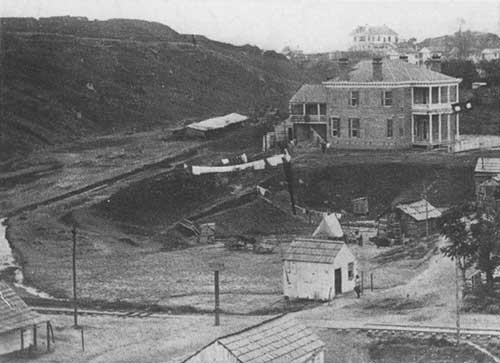
|
A VICKSBURG MANSION BEING USED BY THE U.S. SIGNAL CORPS. (LC)
|
|
Grant used McPherson's and Sherman's corps to converge on Jackson
from two directions. On May 13, McPherson's corps marched for Clinton,
located a few miles north of Raymond and west of Jackson. At Clinton,
McPherson turned east. Sherman's XV Corps moved northeast from Raymond
on the Raymond-Jackson road. McClernand's XIII Corps waited in reserve,
having been ordered by Grant to withdraw from probing along Bakers
Creek just east of Edwards. McClernand's job was to keep Pemberton's
army away from the two Union corps attacking Jackson.
Joseph Johnston arrived in Jackson the same day Grant's forces left
Raymond. Jefferson Davis had decided that Yankee successes in
Mississippi called for Johnston's presence. Johnston was not
enthusiastic about taking command, and when he arrived he concluded, "I
am too late." He observed inadequate entrenchments around Jackson and
decided at once to evacuate the city. Reinforcements were rapidly moving
toward Jackson, and had Johnston decided to stay and fight he would have
had at least enough men to hold Grant off until Pemberton could move
forward and hit the Federal rear.
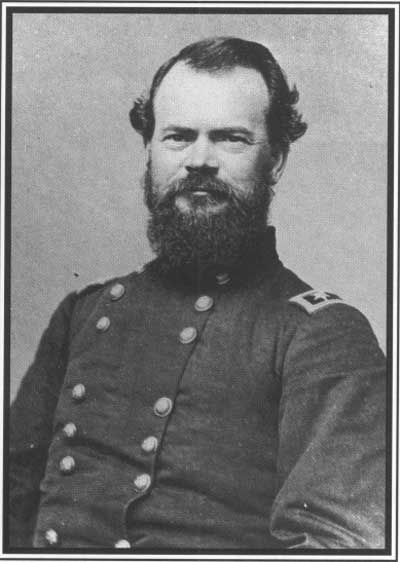
|
MAJOR GENERAL JAMES B. MCPHERSON (NA)
|
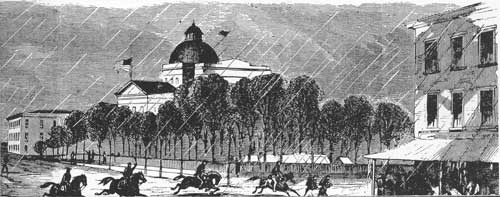
|
A THEODORE DAVIS ILLUSTRATION OF THE STARS AND STRIPES FLYING OVER
JACKSON, MISSISSIPPI (LC)
|
Johnston did not even know Grant's intentions at the time he made the
decision to retreat. But the stoic Johnston usually preferred
retreating to fighting, so he ordered John Gregg to hold out until
supplies and state records had been evacuated and then to bring the
four brigades defending the city to Canton, northeast of Jackson. Gregg,
after his encounter with McPherson at Raymond, gladly obliged, putting
up resistance ranging from token to slight in most sectors of the
Confederate defenses when the Yankees began their assault on May 14.
Sporadic artillery duels, charges, feints, and heavy rain
characterized the Battle of Jackson, which was really more a Confederate
holding action than an all-out fight. Rain during the morning hours
slowed the Yankee attack. Downpours turned roads into ribbons of mud,
making the moving of artillery difficult. Before noon the front passed
through, but the rain had given the Rebels more time to evacuate.
On the southern flank of the Confederate line, Sherman's forces took
advantage of the clearing weather by attacking the Rebel left. They
found empty trenches and unobstructed passage to the state capitol
building. On McPherson's front west of town, the Confederates put up
stiffer resistance, but the results were the same. Several Rebel
sacrificial lambs, left behind to contain the Federals as long as
possible, surrendered to McPherson's corps. Grant had taken Jackson with
less than 300 casualties while Confederate losses were estimated at
about 900. With Johnston's army out of the picture, Grant could now turn
to Pemberton.
Thanks largely to his skill and daring, thus far the campaign since
crossing the Mississippi had gone Grant's way. His diversions had kept
Rebel forces scattered, thus preventing a concentration that could have
left Grant outnumbered. Because he had moved rapidly and had kept
Pemberton guessing, Grant had had superior battlefield numbers at Port
Gibson, Raymond, and Jackson. His good fortune continued now as he
focused on the Confederates waiting near the Big Black.
|
|
